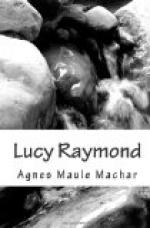“Only, you answered him as if his supposition was correct. I have always understood that intentionally confirming a false impression was at least the next thing to telling a story.”
“Well, I’m sure Stella didn’t think of that,” interposed Lucy good-naturedly, noticing the rising colour of vexation on Stella’s countenance.
“How tiresome they all are here!” thought Stella; “always finding out harm in things. I’m sure it wasn’t my business to tell Uncle William I hadn’t been at Sunday school. Sophy and Ada often tell the housemaid to say they are not at home when they are, and don’t think it any harm. What would Alick say to that?”
By one of those coincidences which sometimes happen—sent, we may be sure, in God’s providence—Mr. Raymond took for his text that evening the words, “Looking unto Jesus, the author and finisher of our faith.” The coincidence startled Lucy, and made her listen with more than ordinary attention to her father’s sermon, though, to do her justice, she was not usually either sleepy or inattentive. Mr. Raymond began by alluding to the “race set before us,” which the apostle had spoken of in the previous verse,—the race which all who will follow Christ must know, but only in the strength He will supply. The young and strong might think themselves sufficient for it, but the stern experience of life would soon teach them that it must be often run with a heavy heart and weary feet; that “even the youths shall faint and be weary, and the young men utterly fall;” and that it is only they who wait on the Lord, “looking unto Jesus,” who shall “mount up on wings as eagles,” who shall “run and not be weary, and shall walk and not faint.”
Then he spoke of the Helper ever near—the “dear Jesus ever at our side,” in looking to whom in faith and prayer, not trying to walk in our own strength, we may get
“the
daily strength,
To none who ask denied,”—
the strength to overcome temptation and conquer sloth, and do whatever work He gives us to do. Something, too, he said of what that work is: First, the faithful discharge of daily duty, whatever its nature; then the more voluntary work for Christ and our fellow-men with which the corners of the busiest life may be filled up—the weak and weary to be helped, the mourner to be sympathized with, the erring brother or sister to be sought out and brought back, the cup of cold water to be given for Christ’s sake, which should not lose its reward.
He ended by speaking of the grounds on which Jesus is the “author and finisher of our faith,” the great salvation won by Him for us on the cross,—a salvation to be entered upon now, so that during this life we may begin that glorious eternal life which is to go on for ever. Then he besought his hearers, by the greatness of that love which had prompted the infinite sacrifice, by the endurance of that mysterious depth of suffering which the Son of God bore for men, that He might “save them to the uttermost that come unto God by Him,” to come at once to have their sins washed away in the Redeemer’s blood, which alone could “purge their consciences from dead works to serve the living God.”




